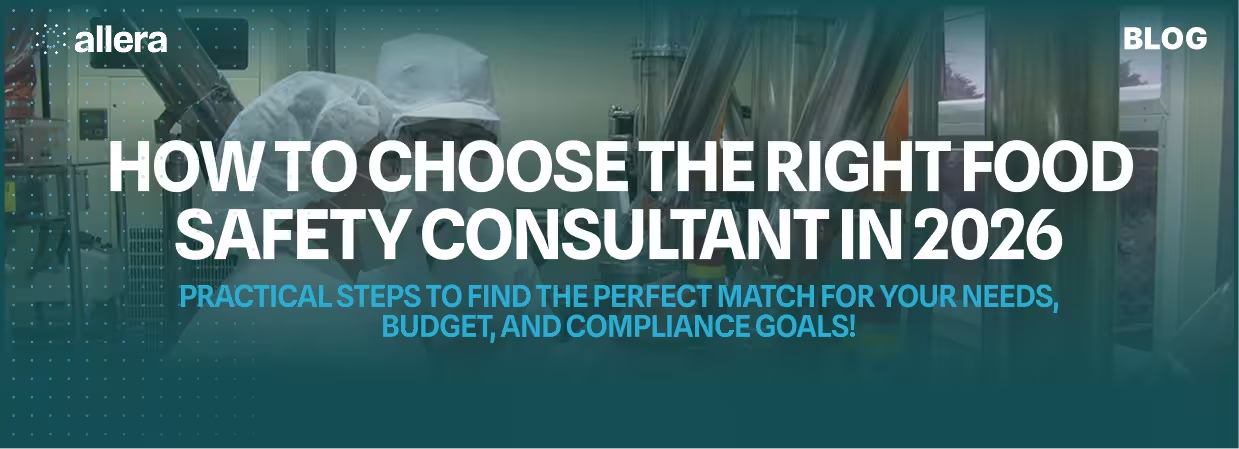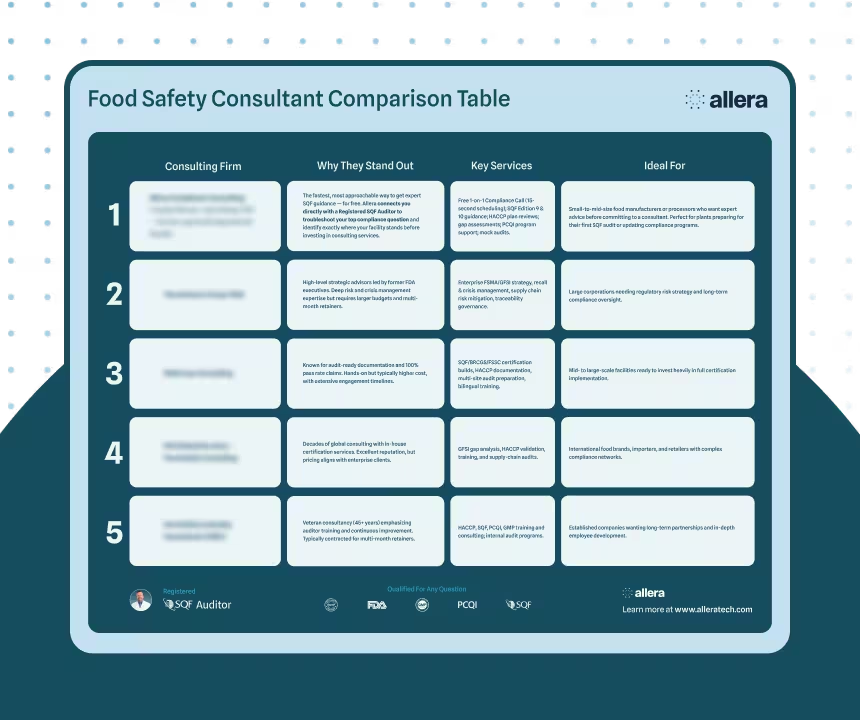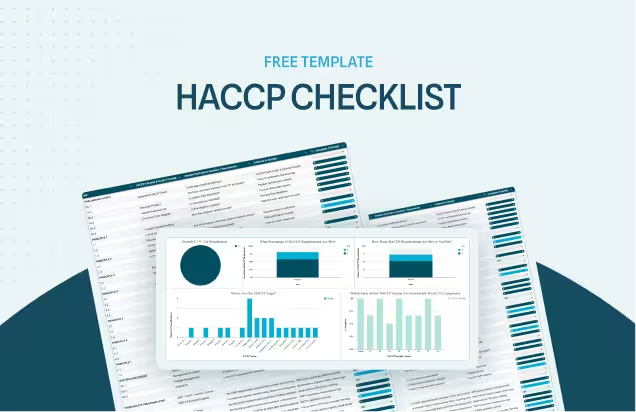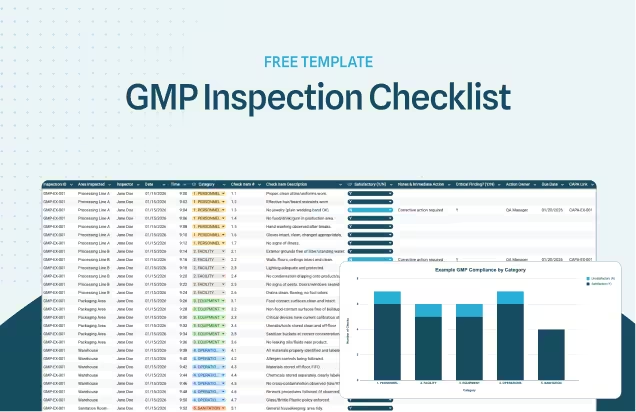

How to Choose the Right Food Safety Consultant in 2026

How to Choose the Right Food Safety Consultant?
Choosing the right food safety consultant for Q4 and 2026 is way to complicated–we get it!
That's why we created this blog: To help you find the perfect consultant, and as a result, achieve compliance!
Why should you keep reading?
Regulations are tightening and audits are becoming more rigorous. Food manufacturers across America are facing mounting pressure to maintain impeccable compliance standards.
So the logical decision is investing in a food safety consultant. But here's the thing: not all consultants are created equal. Some bring decades of expertise and cutting-edge tools to the table, while others might leave you with outdated paperwork and unresolved gaps.
So how do you separate the wheat from the chaff?
This guide walks you through everything you need to know about selecting a food safety consultant who truly aligns with your facility's needs, budget, and compliance goals. Whether you're preparing for your first SQF certification or fine-tuning your HACCP plan for an upcoming audit, we've got you covered.
Key Takeaways
Before we dive deep, let's highlight what you'll learn in this article:
- What makes a qualified food safety consultant and which credentials matter most
- How to assess consultants based on their certification, hands-on experience, and compliance readiness
- Critical questions you should ask before signing any contract
- Why digital tools like compliance management platforms simplify ongoing compliance once your consultant's work wraps up
Think of this as your roadmap to making an informed, strategic hire that protects your brand, streamlines your operations, and keeps you audit-ready year-round.
The Demand is Rising for Food Safety Consultants
The food safety landscape has transformed dramatically over the past decade. With the Food Safety Modernization Act ramping up requirements and global certification bodies like the SQF Institute raising the bar, compliance has become more complex than ever according to the FDA's latest guidance for FSMA regulations. Recent data shows that FDA inspections have increased significantly, and facilities failing to meet FSMA compliance standards face serious consequences including recalls, shutdowns, and reputational damage.
More facilities are now outsourcing their compliance and documentation tasks to specialized food safety consultants.
Why?
Because keeping up with evolving regulations while running day-to-day operations is nearly impossible without expert guidance. HACCP consultants, SQF consultants, and FSMA compliance consultants bring focused expertise that internal teams often lack.
But here's the catch:
Not every consultant is right for your business. Some specialize in certain food categories, others excel at audit preparation, and a few are tech-savvy enough to integrate seamlessly with digital compliance platforms. Choosing wisely means understanding exactly what your facility needs and matching that with the right professional.
Step 1: Define Your Food Facility's Needs
Identify Your Facility's Food Safety Maturity
Before you even start browsing consultant profiles, take a hard look at where your facility stands today.
Are you a startup navigating food safety compliance for the first time? Or are you an established operation looking to upgrade your existing programs?
New facilities typically need consultants who can build foundational programs from scratch, including developing HACCP plans, establishing supplier approval processes, and creating standard operating procedures. Established facilities, on the other hand, might need someone to conduct gap analyses, prepare for re-certification audits, or modernize outdated documentation systems.
Understanding your maturity level helps you communicate clearly with potential consultants and ensures you're not paying for services you don't need.
Understand Your Goals for Hiring a Food Safety Consultant
What's driving your decision to bring in outside help?
Most facilities hire food safety consultants for one or more of these reasons:
Achieving SQF or BRC certification for the first time – These Global Food Safety Initiative standards require meticulous documentation and rigorous food safety audit preparation. A certified SQF consultant knows exactly what auditors look for and can guide you through every requirement, in accordance with standards found on the official GFSI Certification guidance website.
Preparing for an upcoming audit or re-certification – Audit preparation is stressful, and the stakes are high. Consultants help identify gaps, update documentation, and conduct mock audits so you're not caught off guard.
Building or revising a HACCP plan – HACCP remains the cornerstone of food safety programs. Whether you're creating your first plan or updating one to reflect facility changes, a HACCP consultant ensures your critical control points are properly identified and monitored.
Food Safety Consultant Readiness Checklist
Here's a practical checklist to assess your readiness before engaging a consultant:
- Do we have an existing HACCP plan? If yes, when was it last updated?
- What certification standards do we follow (SQF, BRC, GFSI)?
- When is our next audit scheduled?
- Which documentation gaps exist today (supplier approvals, SOPs, training records)?
- Are we currently using digital compliance tools or relying on paper-based systems?
- What's our budget range for consulting services?
Answering these questions upfront saves time during initial consultant meetings and demonstrates you're serious about compliance.
Step 2: Evaluate Consultant Credentials
Key Qualifications to Verify
Not all consultants bring the same level of expertise. When evaluating candidates, look for these essential qualifications:
GFSI or SQF practitioner certification – These credentials prove the consultant has undergone rigorous training and understands globally recognized food safety standards. An SQF consultant with active certification brings immediate credibility—especially one with decades of experience at Nestlé’s Global Supplier Quality division, like Allera’s in-house food safety consultant, who’s guided hundreds of facilities through complex GFSI and FSMA audits.
Proven experience with similar food categories – A consultant who specializes in dairy processing might struggle with meat facilities or bakeries. Industry-specific knowledge matters because each category has unique hazards, regulations, and best practices.
Familiarity with FDA Food Code and FSMA requirements – Your FSMA compliance consultant should be intimately familiar with preventive controls, foreign supplier verification programs, and sanitary transportation rules. Ask for specific examples of how they've helped facilities achieve compliance.
Strong documentation and digital audit support capabilities – Modern compliance requires more than binders full of paper. The best consultants understand how digital platforms streamline documentation, version control, and approval workflows.
The Importance of Digital Documentation Support
Here's where things get interesting. Traditional consultants often deliver Word documents and Excel spreadsheets that quickly become outdated or lost in email threads.
Forward-thinking consultants leverage compliance platforms that centralize documentation, track changes, and maintain version histories automatically.
Platforms (like Allera) simplify documentation review and version control for both consultants and QA teams, a best practice also recognized by USDA Food Safety Resources for organizations seeking to modernize their food safety management. When your consultant can upload SOPs, track supplier documents, and manage approval workflows within a single system, everyone stays aligned and audit-ready. This digital approach eliminates the chaos of scattered files and ensures nothing falls through the cracks.
Step 3: Assess Fit for Your Facility
Communication and Approach Matter––Seriously!
Technical expertise is crucial, but so is working style. Does the consultant communicate clearly? Do they take time to understand your operation's unique challenges? Are they patient when explaining complex regulations to your team?
The best food safety consultants act as educators, not just task-completers. They train your staff, answer questions without condescension, and leave you with knowledge that lasts long after their contract ends. During initial conversations, pay attention to how well they listen and whether they ask thoughtful questions about your facility.
Cultural fit matters too. Some consultants prefer structured, formal interactions while others take a more collaborative, hands-on approach. Choose someone whose style meshes with your team's culture.
Consider Integration with Digital Compliance Systems
Does the consultant embrace modern technology or cling to outdated methods?
Consultants who integrate with digital compliance systems deliver significantly more value because they streamline processes like:
Supplier management: Tracking supplier approvals, certificates, and renewal dates becomes effortless when everything lives in one platform rather than scattered across email and filing cabinets.
SOP updates and version control: When procedures change, digital systems automatically track revisions, notify affected employees, and maintain complete audit trails. This eliminates confusion about which version is current.
Document approvals and training management: Digital workflows ensure the right people review and approve documents before they go live. Training records automatically link to updated SOPs, proving employees learned new procedures.
Step 4: Budget & Scope
How to Understanding Consultant Pricing Models
Food safety consultants typically charge in one of two ways: hourly rates or project-based fees.
Hourly rates for qualified consultants generally range from one hundred fifty to three hundred dollars per hour, depending on their experience level and your facility's complexity. This model works well for smaller projects or ongoing support where scope isn't clearly defined upfront.
Project-based pricing bundles everything into one fee, which might range from five thousand to thirty thousand dollars or more for comprehensive certification preparation. This approach provides cost certainty and often includes deliverables like complete HACCP plans, gap analyses, and mock audit reports.
Some consultants offer retainer arrangements for ongoing support, which can be cost-effective if you need regular guidance throughout the year.
Balancing Cost with Long-Term ROI
Yes, quality food safety consultants cost money. But what's the alternative? Failed audits lead to lost certifications, which means lost customers and revenue. Recalls destroy brands and can bankrupt companies. Viewed through that lens, hiring the right HACCP consultant or SQF consultant isn't an expense—it's an investment in your facility's future.
That said, smart facilities look beyond the consultant's immediate work. Consider digital tools that continue the compliance work after your consultant departs. AI-assisted SOP reviews, automated supplier tracking, and real-time compliance checks provide ongoing value that compounds over time. When you factor in these long-term efficiencies, the total cost of compliance actually decreases while quality improves.
Step 5: Questions to Ask Before Hiring
Don't just accept a consultant's marketing pitch at face value. Dig deeper with these critical questions:
"Can you provide examples of successful SQF certifications you've supported?"
Ask for specific facilities, challenges they faced, and how the consultant helped overcome them. References from similar operations carry tremendous weight.
"How do you help facilities transition documentation to digital systems?"
This reveals whether they're forward-thinking or stuck in the paper era. The best consultants actively help you modernize rather than perpetuating outdated processes.
"Do you offer ongoing support post-certification?"
Compliance doesn't end when you pass your audit. Find out if they provide follow-up services, answer questions down the road, or offer refresher training.
"How do you ensure your recommendations align with FSMA and GFSI updates?"
Regulations evolve constantly. Your consultant should demonstrate continuous learning and staying current with industry changes.
Also ask about their availability, typical project timelines, and what they expect from your team. Clear expectations prevent misunderstandings and ensure smooth collaboration.
How to Maintain Compliance After the Consultant Leaves
The Common Post-Consultant Problem
Here's a scenario that plays out constantly across food manufacturing: A facility hires an excellent consultant, achieves certification, celebrates success, and then gradually reverts to old habits. Documentation slips, training records pile up, supplier certificates expire unnoticed, and before long, they're scrambling before the next audit.
Why does this happen? Because consultants build temporary structures, but lasting compliance requires permanent systems and cultural commitment. When consultants deliver binders of documents or folders of spreadsheets, maintaining those resources becomes someone's additional responsibility—and additional responsibilities get deprioritized when production demands increase.
Implementing a Sustainable Compliance Platform
The solution lies in implementing a dedicated compliance platform that makes ongoing maintenance effortless rather than burdensome. Modern systems like Allera provide:
Continuous document tracking – Every SOP, policy, and procedure lives in one centralized, searchable location. No more hunting through shared drives or filing cabinets.
Expiration alerts – Supplier certificates, employee certifications, and calibration records trigger automatic reminders before they expire. You stay proactive instead of reactive.
Approval workflows and version history – Changes flow through proper approval channels automatically. Complete audit trails show exactly who changed what and when, satisfying auditor requirements effortlessly.
Real-time AI compliance checks – Advanced platforms use artificial intelligence to flag potential compliance issues before they become problems. Think of it as having a virtual consultant reviewing your work 24/7.
When your consultant's recommendations live within a platform designed for long-term compliance management, their work continues delivering value year after year—supported by well-established frameworks such as those laid out by BRCGS for food safety certification. Your team spends less time on paperwork and more time on what matters—producing safe, quality food products.
Build a Lasting Compliance Partnership
Overall, choosing the right food safety consultant is about working with a partner you can trust. Allera’s trusted food safety consultant, backed by 20+ years at Nestlé, and years of experience as an SQF auditor, offers free compliance consultations to help facilities plan certification pathways, streamline documentation, and stay audit-ready all year long.
Remember these key principles:
- Define your needs clearly before you start searching.
- Evaluate credentials rigorously, especially certifications and industry-specific experience.
- Assess fit based on communication style and technological fluency.
- Budget wisely by considering both immediate costs and long-term ROI.
- Ask tough questions that reveal depth of expertise and approach to modern compliance challenges.
Most importantly, recognize that even the best consultant only sets the foundation. Sustained compliance requires the right tools, clear processes, and a culture that prioritizes food safety every single day. When you combine expert guidance with powerful compliance technology, you create an unstoppable system that keeps you audit-ready year-round.
FAQs
%20(1).avif)
.avif)




.avif)




.avif)


.avif)
.avif)

